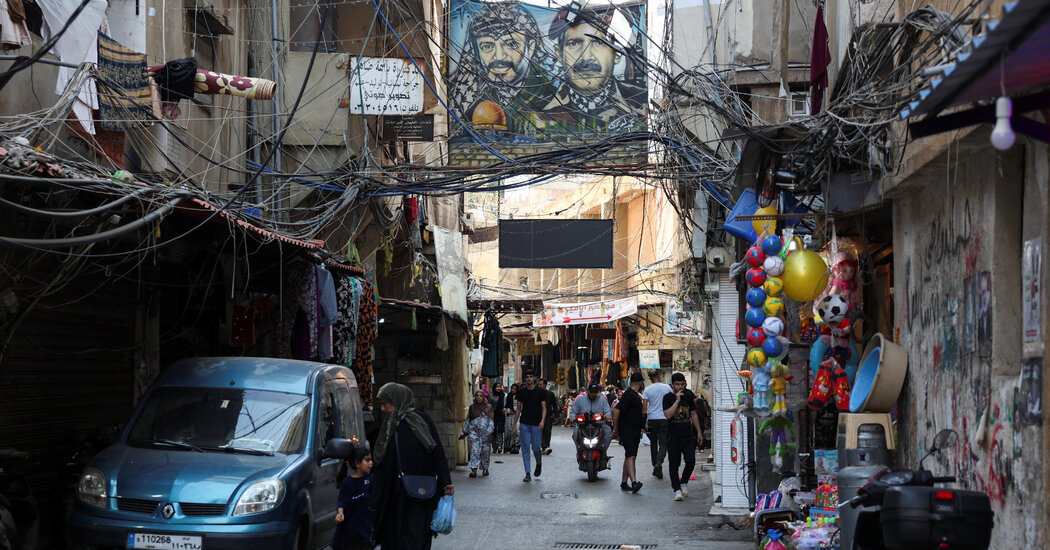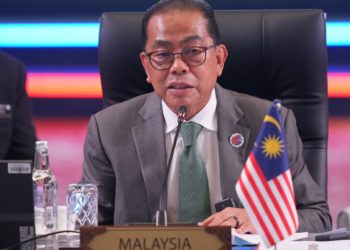Lebanon’s government will begin disarming the armed Palestinian factions in refugee camps on its territory in June, an important step toward its goal of bringing all weapons in the country under state control, a spokesman for the prime minister said on Friday.
Disarming the Palestinian factions will be a trial run ahead of a much larger challenge: stripping the powerful Iran-backed Lebanese militia, Hezbollah, of its weapons.
“This is a test,” said Mohanad Hage Ali, a fellow at the Carnegie Middle East Center in Beirut. “If this happens smoothly, then yes, maybe this will expedite” the process of disarming Hezbollah.
Despite their nominal authority, the Lebanese state and its military have long been sidelined in matters of war, peace and security by an array of armed groups outside of their control. Foremost among them is Hezbollah, which has long dominated the south of Lebanon and which has military capabilities that far outstrip those of the Lebanese Armed Forces.
Palestinian armed factions hold sway in Lebanon’s impoverished, overcrowded Palestinian refugee camps, where the Lebanese army does not enter.
But after the latest wars with Israel weakened Iran-backed militias across the region, including Hezbollah and Hamas in Gaza, Lebanon’s new government has moved to end Hezbollah’s dominance and assert its own authority.
The president, Joseph Aoun, has vowed to disarm Hezbollah and Palestinian armed factions in Lebanon.
In a meeting on Wednesday in Beirut, the Lebanese capital, Mr. Aoun struck a formal agreement with the Palestinian Authority president, Mahmoud Abbas, to support the disarming of the camps, according to Mounir al-Rabih, a spokesman for Prime Minister Nawaf Salam of Lebanon.
Mr. Abbas heads an administration that oversees parts of the Israeli-occupied West Bank.
“They voiced their belief that the era of weapons outside the authority of the Lebanese state is over,” said a joint statement issued afterward, “especially since the Lebanese and Palestinian peoples have paid a heavy price for decades, with huge losses and significant sacrifices.”
Hezbollah launched repeated attacks on Israel from southern Lebanon starting in October 2023, when the war in Gaza began and Hezbollah joined in to support Palestinians in Gaza. Israel’s retaliation against Lebanon exacted a heavy price, killing more than 4,000 Lebanese, and many Lebanese turned on Hezbollah.
Though hostilities largely waned after a November cease-fire, Palestinian fighters have fired rockets at Israel from Lebanon in recent months. The rockets drew further damaging retaliation from Israel, which has also repeatedly violated the cease-fire, and prompted Lebanon to arrest several Palestinian operatives.
The cease-fire agreement requires Lebanon to wrest weapons from Hezbollah, a key demand of Israel and the United States. But doing so will be difficult given Hezbollah’s entrenched power and its ongoing broad support among many Lebanese Shiites.
About 222,000 Palestinian refugees live in 12 camps across Lebanon, where they arrived after being forced to leave their homes during the 1948 war surrounding Israel’s creation as a state, according to the United Nations agency that serves Palestinian refugees.
In the decades since, many of the so-called camps have grown into full-fledged neighborhoods or towns.
Security is handled by Hamas, Mr. Abbas’s Fatah faction and other armed factions. But internal clashes and the proliferation of weapons have caused repeated Lebanese and Palestinian civilian deaths over the years.
Such groups have deep roots and long histories in the camps that could complicate an orderly transfer of weapons. But Mr. Ali said international players with ties to Palestinian groups, such as Turkey and Qatar, were serving as mediators, perhaps smoothing the process.
The head of a joint Palestinian-Lebanese committee for monitoring the camps, Ramez Dimashkieh, said the two sides had not decided on a mechanism for disarmament, other than to agree that the Lebanese army and security services would take the lead.
Palestinian armed groups have also suffered setbacks in neighboring Syria in recent months, after rebels seized power in December from Syria’s former president, Bashar al-Assad. Under Mr. al-Assad, a close ally of Iran, Syria had allowed several Palestinian armed groups to operate freely there.
Signaling a shift, however, the new Syrian authorities in April arrested two senior members of the Palestinian armed faction Islamic Jihad, an Iran-backed Hamas ally. Syria did not give a reason for the arrests, but its new leaders have sought to break with Iran and also face U.S. pressure to suppress extremist groups.
Some Palestinians and their allies have called for both Syria and Lebanon to maintain their support for resisting Israeli occupation and its continuing attacks on Gaza. But others said Palestinians should not interfere in internal Lebanese affairs.
“It’s time to transform the Palestinian community in Lebanon into a civilian one, and restrict weapons within official Palestinian leadership, within legitimate authority,” said Hisham Debsi, a Palestinian researcher who directs the Tatweer Center for Strategic Studies and Human Development.
Vivian Yee is a Times reporter covering North Africa and the broader Middle East. She is based in Cairo.
The post Lebanon Moves to Disarm Palestinian Groups, a Test Run for Hezbollah appeared first on New York Times.




